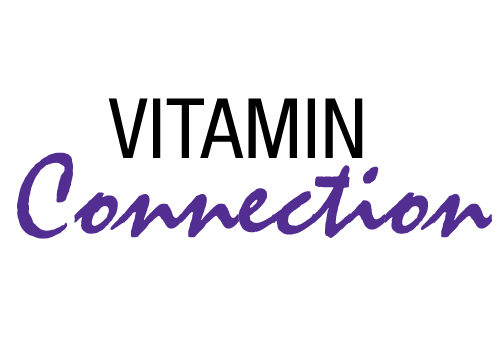My wife, Barbara, was raised in a magical mushroom land in southeastern Pennsylvania between Kennett Square and Lancaster. I vividly remember the stimulation of my olfactory system as I drove through the lands neighboring Kaolin where mushroom soils and fertilizers were produced.
As a teenager, my wife had an afterschool job helping a local farmer grow mushrooms. She remembers it well. Then, mushrooms were known simply as a pleasant food, but today, they are considered a superfood and are also the focus of scientific research, as strong evidence suggests they have health benefits including cancer prevention and treatment. Not much was known about the health benefits of polysaccharides on the body’s immune system in those days.
In October, I was pleased to learn that in the Philippines, they were 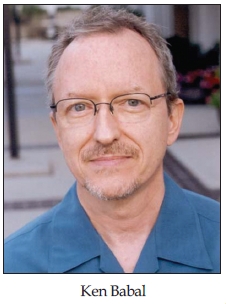 celebrating the first anniversary of the Mushrooms Go Pink Breast Cancer Awareness Campaign. In the United States, mushroom growers are prohibited from saying much about this research for fear of U.S. Food and Drug Administration actions such as with cherry growers. But in other countries, there seems to be more freedom of commercial speech. Suppression of truth always gets a reaction from me, so I called upon a mushroom expert to further discuss the nutritional and health benefits of mushrooms.
celebrating the first anniversary of the Mushrooms Go Pink Breast Cancer Awareness Campaign. In the United States, mushroom growers are prohibited from saying much about this research for fear of U.S. Food and Drug Administration actions such as with cherry growers. But in other countries, there seems to be more freedom of commercial speech. Suppression of truth always gets a reaction from me, so I called upon a mushroom expert to further discuss the nutritional and health benefits of mushrooms.
Ken Babal is the author of four books on mushrooms. He is a licensed clinical nutritionist with over 30 years of experience. He is a consultant to the natural food and supplement industry and a former instructor for Southern California School of Culinary Arts. Babal has written over 500 articles that have appeared in many popular and professional publications including Let’s Live, Great Health, Taste for Life, Health Store News, Doctors’ Prescription for Healthy Living, Townsend Letter, Well Being Journal and Drum. He is author of Good Digestion: Your Key to Vibrant Health (Books Alive, 2000), Seafood Sense: The Truth about Seafood Nutrition and Safety (Basic Health Publications, 2005) and Mushrooms for Health and Longevity (Books Alive, 2011). Ken appears in the Discovery Health Channel documentary Alternatives Uncovered, E! TV’s The High Price of Fame: Starved! and the reality TV series, Kathy Griffin: My Life on the D-List. He has also been a guest on many local and national radio programs.
Passwater: Many people view mushrooms as “special,” not only because of their flavor, but also because they have special health properties. As we speak, a mushroom diet is gaining notoriety. You have written four books on mushrooms. What initiated your interest in mushrooms? Why were mushrooms so special to you?
Babal: Mushrooms are special because they are neither plant nor animal. As members of the fungal family, they are unique, offering benefits unlike those of herb or vitamin supplements. Their genetic makeup is actually closer to humans than plants. They mimic human respiration by capturing oxygen and exhaling carbon dioxide while plants absorb carbon dioxide and liberate oxygen. In our forests, mushrooms perform the essential ecological function of recycling leaves and dead plants.
As food and medicine, their benefits are exceptional. In Asia, certain types have been revered for their ability to maintain and improve health, preserve youth and increase longevity. In many classic herbal formulations, they are considered the main ingredient, or emperor.
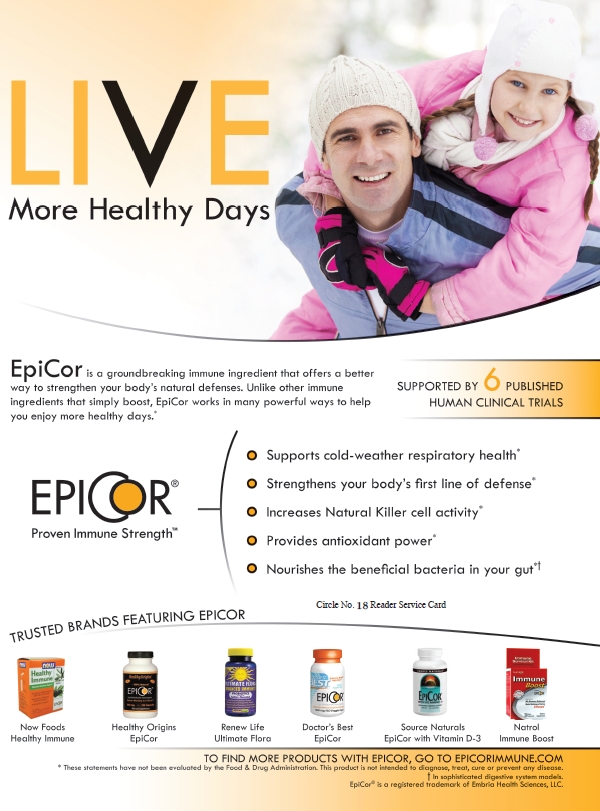 Passwater: Chefs seem to use mushrooms more for their flavoring of other foods than for preparing a dish of mushroom alone. Aren’t mushrooms a pleasant dish by themselves? What are the nutritional benefits of mushrooms?
Passwater: Chefs seem to use mushrooms more for their flavoring of other foods than for preparing a dish of mushroom alone. Aren’t mushrooms a pleasant dish by themselves? What are the nutritional benefits of mushrooms?
Babal: Yes, there are chefs willing to pay literally hundreds of thousands of dollars for a rare truffle weighing a few pounds in order to flavor their recipes. One of my favorite side dishes is to simply sauté sliced shiitakes with garlic and olive oil, then season with a little salt and lemon juice. You can’t beat it!
Nutrition-wise, they are a good source of protein, B vitamins, trace minerals and fiber. In addition, mushrooms are the only vegan source of vitamin D, other than sunlight. They contain abundant quantities of ergosterol, which is converted to active vitamin D in the body, just as beta carotene in fruits and vegetables is converted to vitamin A. However, some growers are briefly exposing their mushrooms to ultraviolet light, which converts the ergosterol into ergocalciferol, the active vitamin D2. Mushrooms react to sunlight the same way as humans and produce a totally natural form of vitamin D.
Passwater: What effect does food preparation have on mushrooms, nutritionally and health benefit-wise? Do the mushrooms used as a pizza topping or a meatloaf sauce still have nutritional value?
Babal: There are a few tips you should know when preparing fresh and dried mushrooms to minimize nutrient losses. Beta glucan, the active compound in Maitake and other mushrooms, is hot-water extractable. That is, it dissolves in cooking water. As with cooking vegetables, you should recover the liquid to make use of all nutrients. The cooking water can be used for soups, stews or sauces.
Other compounds that are important for lowering blood pressure, blood sugar and cholesterol are fat soluble. This means that if you stir-fry, these substances will dissolve into the cooking oil. Also, research indicates that the more mushrooms are heated, the less effective their anti-obesity activity. So, to summarize, the best way to consume mushrooms is to include the cooking liquids and be careful not to overcook them.
Passwater: Many studies show that some mushrooms have anti-cancer properties. What should our readers know about the anti-cancer properties of specific mushrooms?
Babal: Mushroom extracts are probably the most 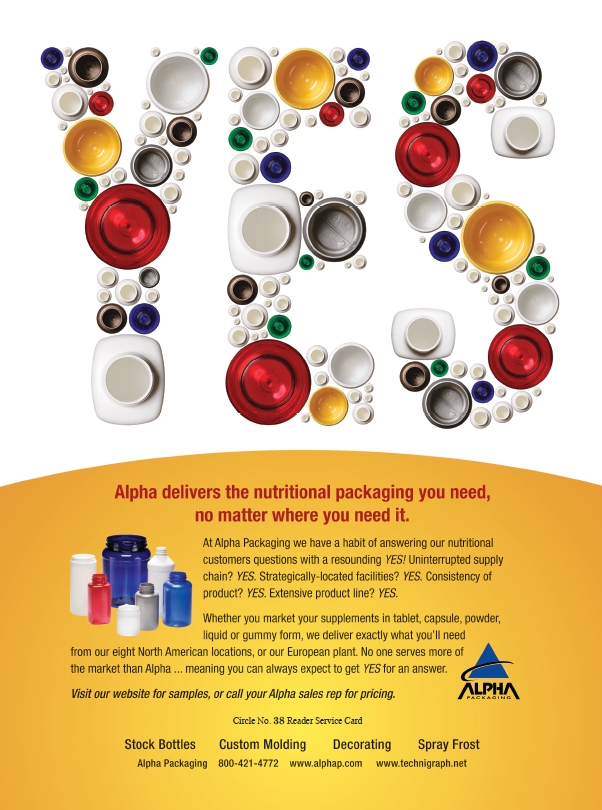 effective substances whether drug or natural product for strengthening immunity. Studies show that certain extracts, like Maitake D-fraction, have potent antitumor properties that make them promising cancer treatments. Some people are surprised to learn that PSK, a turkey tail mushroom extract for injection, is a best-selling anticancer drug in Europe and Japan. Retailers’ store shelves hold some of the very best natural products by way of mushroom extracts for supporting conventional or alternative cancer treatments. D-fraction has crossed over into mainstream medicine and is now being used in some U.S. cancer hospitals.
effective substances whether drug or natural product for strengthening immunity. Studies show that certain extracts, like Maitake D-fraction, have potent antitumor properties that make them promising cancer treatments. Some people are surprised to learn that PSK, a turkey tail mushroom extract for injection, is a best-selling anticancer drug in Europe and Japan. Retailers’ store shelves hold some of the very best natural products by way of mushroom extracts for supporting conventional or alternative cancer treatments. D-fraction has crossed over into mainstream medicine and is now being used in some U.S. cancer hospitals.
Passwater: What research is there on Maitake and lion’s mane?
Babal: Many anticancer studies have focused on Maitake D-fraction, a concentrated extract developed in Japan containing a protein-bound beta glucan, which has been shown to stimulate vital components of cellular immunity such as T cells, B cells, macrophages and natural killer cells. In 2011, a breakthrough study found that D-fraction up-regulates 22 apoptosis genes, including the BAK-1 gene. Researchers concluded that Maitake D-fraction has strong anticancer properties in breast cancer cells through BAK-1 gene expression. This is highly significant because it places D-fraction in a unique category apart from other immune boosters, antioxidants and apoptosis-inducers.
Passwater: Pardon my interruption, but specifically, what is the D-fraction? How is it different from whole Maitake?
Babal: Basically, D-Fraction is a standardized hot-water extract of Maitake that isolates and concentrates the primary immune-enhancing component of the mushroom plus approximately 30% of the protein found in Maitake. Whole Maitake contains many fractions but in much lower concentrations.
Passwater: Okay, I interrupted you. I believe you were about to tell us about lion’s mane.
Babal: I predict there will be a lot of interest in lion’s mane mushroom because of its potential to prevent and treat dementia. Surveys show that Alzheimer’s disease is the most feared disease after cancer. Japanese researchers have discovered a class of compounds in lion’s mane, called hericenones, which stimulate the production of nerve growth factor, causing neurons to regrow. Since the discovery of nerve growth factor, scientists have been interested in ways of enhancing it. Because it can’t cross the blood–brain barrier, it can’t be administered as an oral drug. So, it’s wonderful that a mushroom has this remarkable ability.
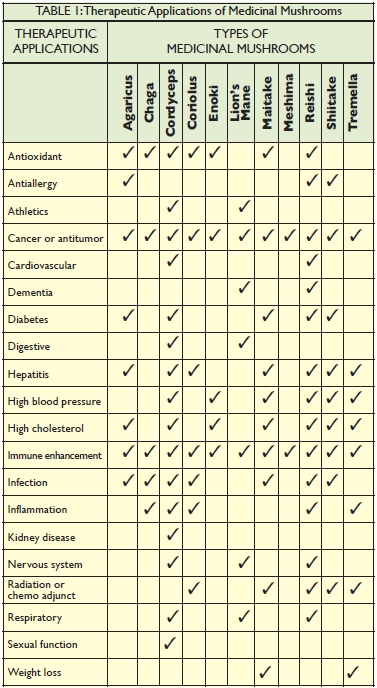 Passwater: How about the extract active hexose correlated compound (AHCC), an alpha-glucan rich extract produced from the mycelia of shiitake (Lentinula edodes) of the basidiomycete family of mushrooms?
Passwater: How about the extract active hexose correlated compound (AHCC), an alpha-glucan rich extract produced from the mycelia of shiitake (Lentinula edodes) of the basidiomycete family of mushrooms?
Babal: AHCC is a fermentation product of shiitake and other related mushrooms. Strictly speaking, it is a derivative of alpha glucan, not pure alpha glucan, and is not found in typical mushrooms. Beta glucan is the main component of mushrooms, though AHCC does stimulate immune cells and has antitumor activity.
Passwater: What other health conditions might mushrooms be useful for?
Babal: The one common property of mushrooms is their ability to enhance immunity. However, certain ones have special attributes. In addition to beta glucan, researchers have identified compounds in Maitake called glycoproteins that enhance insulin sensitivity, and can be concentrated in an extract. Cordyceps and reishi are cardiovascular tonics and tremella has incredible skin-hydrating properties, which can be incorporated into face creams. Cordyceps is also a good choice for athletes, and as a sexual tonic.
By the way, I’d like to dispel a common myth: mushrooms do not cause yeast infections! Infections, including Candida infections, are usually symptomatic of low immunity. Mushrooms, as I have pointed out, strengthen immunity. In fact, Cordyceps and shiitake have been used clinically to treat Candida. Please see Table 1, “Therapeutic Applications of Medicinal Mushrooms.”
Passwater: The table is a good summary. Can mushrooms also help slow the aging process?
Babal: Yes, mushrooms should be of great interest to those wishing to slow the aging process. Reishi is called “the mushroom of immortality” and has been consumed in China for thousands of years as an anti-aging herb and to improve the capacity of the mind and memory. In addition, many mushrooms, chaga, for example, possess potent antioxidant activity.
Passwater: Do mushroom extracts have the same benefits as whole mushrooms?
Babal: Yes, and they’re more concentrated. However, if you’re looking for a high concentration of vitamin D, I would suggest whole mushrooms that have been exposed to UV light.
Passwater: Do you recommend mushroom supplements as part of everyone’s supplement program?
Babal: I do. Mushrooms are natural medicines that help protect us from the health challenges of the 21st century. It makes good sense to include them as a regular part of the diet. However, people who want more powerful, consistent effects or do not enjoy eating mushrooms should consider mushroom supplements. In some cases, mushrooms are not edible and can only be taken as supplements. Reishi, for example, is too tough and woody to eat. Also, there are a number of active ingredients in mushrooms that are obtained by alcohol extraction or methods other than simple hot-water extraction. The best way to obtain these constituents is to take standardized liquid or dried mushroom extracts. In my opinion, a supplement program is not complete without a mushroom supplement.
Passwater: What is your opinion of the current mushroom diet, aka the M-Plan, that is sweeping Hollywood?
Babal: Mushrooms are an ideal food for weight control. They’re high in fiber, which creates a sense of fullness and regulates bowel function. They’re also rich in protein, needed to maintain metabolically active muscle. Weight loss on mushroom diets has been observed in both human and animal studies. The M-Plan swaps several servings of meat per week for mushroom-based dishes that tend to be lower in fat and calories, like spinach and mushroom salad or mushroom omelets. So, the diet seems sensible.
Passwater: Please tell us about some of your books.
Babal: My first book in the Alive series was Good Digestion: Your Key to Vibrant Health. I felt that it was a good subject to start with because good digestion is such a fundamental requirement of health. When a person maintains efficient digestion, a strong body chemistry is the result and all other systems begin to benefit. Seafood Sense: The Truth about Seafood Nutrition and Safety (Basic Health Publications) came next. I wanted to address all of the confusion and controversy surrounding seafood consumption and  fish oil supplementation. I’m proud to say the book was endorsed by Stephen Sinatra and Hyla Cass.
fish oil supplementation. I’m proud to say the book was endorsed by Stephen Sinatra and Hyla Cass.
Passwater: Thanks for sharing your expertise on mushrooms with our readers. Readers may also like to know that many of your articles can be accessed on your Web site www.NutritionMusician.com. In addition to your nutrition articles, readers may also enjoy your talent as a musician.
Babal: Thank you, Dr. Passwater. WF
Dr. Richard Passwater is the author of more than 45 books and 500 articles on nutrition. Dr. Passwater has been WholeFoods Magazine’s science editor and author of this column since 1984. More information is available on his Web site, www.drpasswater.com.
References
Hayakawa, K. et al. 1993 “Effect of Krestin (PSK) as Adjuvant Treatment on the Prognosis after Radical Radiotherapy in Patients with Non-Small Cell Lung Cancer.” Anticancer Research 13:1815-1820.
Kodam, N. et al. “Effect of Maitake (Grifola frondosa) D-Fraction on the Activation of NK Cells in Cancer Patients,” Journal of Medicinal Food 6(4)2003, pp. 371-377
Soares, R. et al. “Maitake (D-Fraction) Mushroom Extract Induces Apoptosis in Breast Cancer Cells by BAK-1 Gene Activation.” Journal of Medicinal Food 14(6), 563-572, 2011.
Konno, S. 2001. “Maitake SX-Fraction. Possible Hypoglycemic Effect on Diabetes Mellitus.” Alternative and Complementary Therapies, December, 366-370.
Mori, K et al. “Improving Effects of the Mushroom Yamabushitake (Hericium erinaceum) on Mild Cognitive Impairment: A Double-blind Placebo-controlled Clinical Trial.” Phytother Res, 23, 367-372 (2009).
Lottor, E. “Amyloban 3399 Product Study for Cognitive Function Improvement.” Townsend Letter, 94-95, May 2009.
Published in WholeFoods Magazine, February 2014

